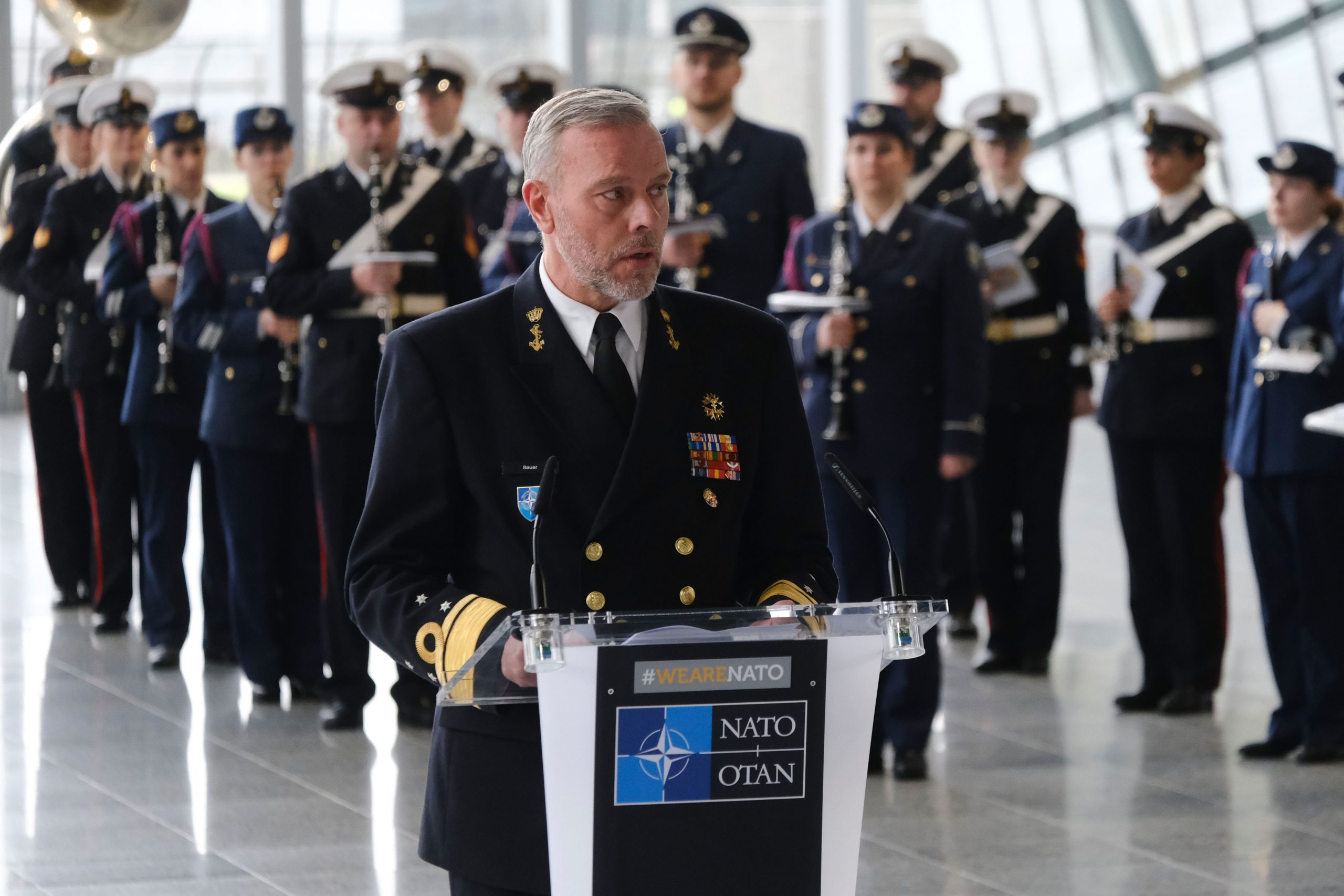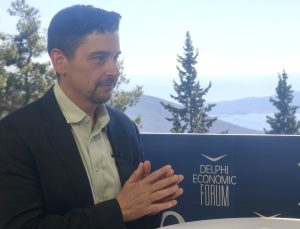AMSTERDAM—War is forcing NATO’s top military officer to act like a business executive.
For Dutch Admiral Rob Bauer , management concerns such as factory production, corporate finance and investment regulations have assumed an urgency comparable to troops and weapons. All are vital to achieving the North Atlantic Treaty Organization’s goal of defending its 32 members.
Bauer’s new focus is part of a broader profile shift for the 61-year-old career military man, prompted by Russia’s decade of hostility to Ukraine, which is now widely seen as threatening the rest of Europe.
When Bauer was a young naval officer walking across the Dutch capital, locals would sneer at his uniform and even call him a murderer, he recalls. Today he faces less vitriol—though still encounters some—and greater public interest in his mission.
Bauer is being welcomed outside the military world as never before. His schedule regularly includes meetings with financiers, executives and industrial policymakers.
He is using the exposure to warn of threats he sees, starting at home with Europe’s insufficient and inefficient military spending.
His exhortation: To avoid death and destruction, the West needs not only to boost military production; it must fundamentally rethink what defense means, starting with the private sector.
NATO’s European members produce 172 different weapons systems, Bauer frequently notes, while the U.S.—which accounts for two-thirds of NATO’s roughly $1.1 trillion in annual military spending—uses only about 35 main weapons platforms. He says European efforts to rationalize defense industries fall short.
“Politicians always talk about cooperation, but in practical terms they don’t have a clue,” said Bauer, who has served since 2021 as chair of NATO’s military committee.
The holder of the position is the top adviser on military issues to NATO’s secretary-general. A recent predecessor, retired Czech Army General Petr Pavel , is now president of his country and helped secure almost one million artillery rounds for Ukraine this year.
Bauer mostly focuses on troops, equipment and NATO’s ability to deploy them in a crisis. War in Ukraine has strained all of those necessities. Bauer says one reason is that since the Cold War, the West has taken military protection for granted and considered it divorced from everyday life or commercial activity.
The result he sees is a literal undervaluing of security because military cuts aren’t considered to have a potentially negative long-term impact on national wealth.
“In models of value-added in an economy, defense is never factored in,” he told a group of Canadian defense-industry executives who recently visited NATO headquarters in Brussels.
He said the approach is wrongheaded because security is the foundation on which private business operates.
War in Ukraine has shown that factories, power grids and bridges can be wiped from the map, Bauer noted. Since World War II, the Western private sector didn’t need to worry about issues like, “Is my factory physically there tomorrow morning?”
The Canadian executives agreed and voiced frustration with their government’s military spending level, among the lowest in NATO.
“I do not see enough business executives going public on this,” Bauer said of security’s critical role in prosperity.
Bauer started focusing on the business side of defense a dozen years ago when he was head of planning at the Dutch defense ministry and its navy needed new frigates. Germany was also in the market and their ships would be almost identical. Bauer proposed to his German counterpart that they place a joint order, bringing in Belgium and gaining scale economies.
Defense officials were enthusiastic about the idea, Bauer recalls, but it failed due to industry opposition. Each country’s national contractor wanted to guard its domestic market and lobbied governments to keep the projects separate, he said. That approach is why Europe has about five times as many military platforms as the U.S. does.
“I’m not suggesting we close any facilities, just that we make more of the same things,” Bauer said.
Even when companies want to cooperate, governments often can’t synchronize their defense budgets, impeding multicountry contracts. Compounding the problem is the legacy of widespread arms-industry consolidation and plant closures after the Cold War, when free-market economics took the fore in all aspects of society.
“We have become too dependent on the market—and actually there isn’t a market” for defense products, Bauer said. Since Russia’s invasion of Ukraine two years ago, the lack of a market response has delayed deliveries and pushed up prices far faster than it has boosted production, he said. One example he cites: a fourfold jump in the price of NATO-standard 155mm artillery shells since January 2022.
As Bauer over recent years dug into why output was rising so slowly, he discovered that many European investment companies won’t fund military production, fearing they will run afoul of environmental, social and corporate-governance regulations.
“It’s a big and growing concern in Europe,” said Jan Pie, secretary-general of the Aerospace, Security and Defense Industries Association of Europe, who sees banks, insurers and pension funds excluding military contractors from their portfolios.
To Bauer, the exclusion is absurd and creates a problem when arms companies that want to invest can’t get adequate funding due to sustainability goals. Strong defense is like a 7-foot bouncer at a nightclub, he said, sending the message that picking a fight would be pointless.
“If we maintain peace through deterrence, that is extremely sustainable,” he said. “The financial sector plays a role here in the solution, and is now part of the problem.”
Bauer isn’t alone. The European Union, which long avoided military spending, is making money available for defense and starting to examine potential conflicts between security and ESG rules.
“It’s really important not to set the two things up as opposites,” said Margrethe Vestager , the EU’s competition chief.
Bauer, who says his role is “trying to start a conversation,” advocates government responses that over the past two years have swung from unthinkable to active policy considerations, such as tapping the EU’s European Investment Bank to help bridge out-of-sync national budgeting cycles.
Former Canadian navy chief Mark Norman , a retired vice admiral who led the recent Canadian industry delegation, said Bauer faces a tough task in trying to manage NATO’s 32 countries with widely varying views on defense. Norman praised Bauer’s effort to address “how the defense industry is integrated into the overall industrial framework of a country so it’s not seen as fat cats enriching themselves.”
Within NATO, Bauer is widely seen as a powerful advocate in a time of crisis and unusual in how he bridges the military and civilian sides of the alliance.
“He doesn’t shy away from speaking about important things, even things that are not traditionally in his lane,” said Camille Grand, a former NATO assistant secretary-general for defense investment.
Retired NATO spokeswoman Oana Lungescu said Bauer mixes a typically Dutch bluntness with “a very refreshing touch of candor.” He has raised awareness of a need to change mindsets in finance and other fields that people don’t typically see as linked to defense, and has done so “in a way that is much more effective coming from a man in uniform than from a politician in a suit,” Lungescu said.
Bauer still faces widespread resistance and hostility. On a visit in February to Ireland, which cooperates with NATO but isn’t a member, anti-NATO, pro-Palestinian protesters outside the venue where he spoke were so loud that he had to check attendees could hear him.
A recent onstage conversation at Amsterdam University was interrupted by similar protests. But Dutch opinions show signs of shifting.
“My generation has never lived in a world with an actual threat. We’re very spoiled with safety,” said Annelien van Drooge, a 37-year-old Dutch data consultant in Amsterdam. “I see an argument that we need to invest to show we’re ready, and not a weak target for Putin,” she said, adding that the issue receives insufficient attention.
Write to Daniel Michaels at Dan.Michaels@wsj.com



